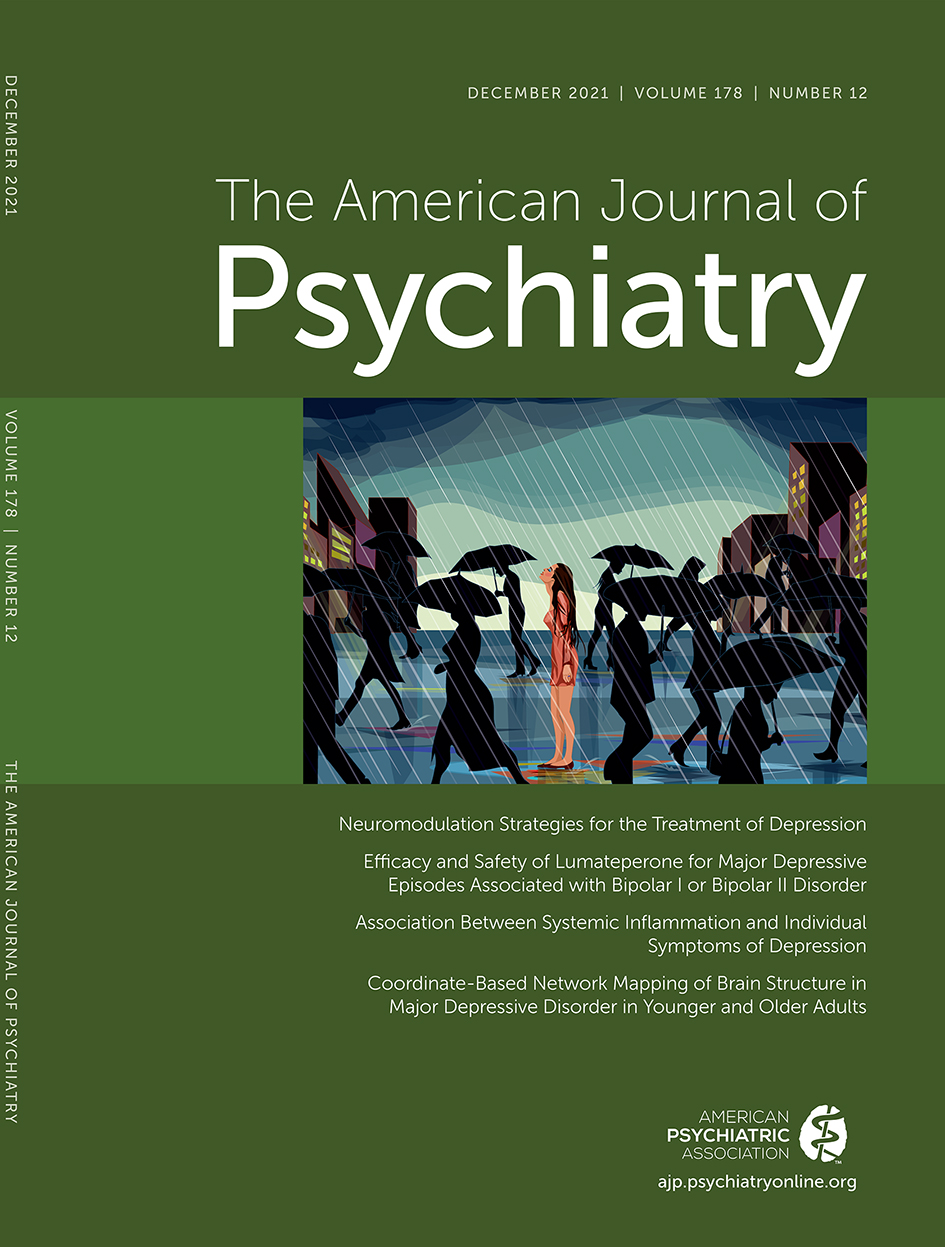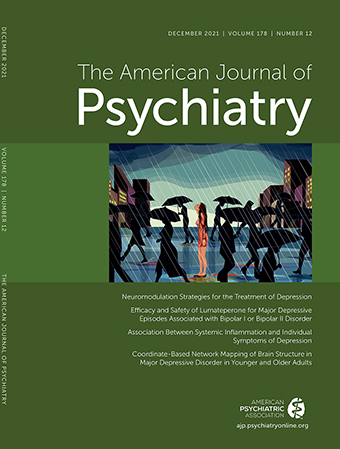There is undoubtedly a need for better well-studied treatments for major depressive episodes in patients with bipolar disorder. This is true not only for people with bipolar I disorder but, even more importantly, for patients with bipolar II disorder—a disorder with a single compound approved by the U.S. Food and Drug Administration (FDA) for acute treatment only (quetiapine, both immediate release and extended release) and with little other quality data to drive treatment decisions in the clinic. But both bipolar I and II disorders are, for the vast majority of people, lifelong and chronically relapsing conditions, and the lack of longitudinal data to guide care for the depressive phase of the illness leaves many patients with treatment guided by anecdotal evidence, evidence of low quality, and expert opinion rather than with much certainty (
1).
The study published in this issue by Calabrese et al. (
2) of a multicenter trial of a single dose of lumateperone, a butyrophenone atypical antipsychotic, conducted by Intra-Cellular Therapies, sheds a limited amount of light on this very dark problem. In this study, 377 analyzable subjects with bipolar I (N=301) or II (N=76) disorder and a current major depressive episode were randomly assigned to receive lumateperone or placebo for 6 weeks. Using a mixed-effects model for repeated measures, the authors found a greater improvement with study drug on the Montgomery-Åsberg Depression Rating Scale (−4.6 points, 95% CI=−6.34, −2.83) over the short treatment period. The drug provided benefit for both patients with bipolar I and bipolar II disorder. (An earlier study of 554 patients with bipolar I and II disorder with depression comparing two dosages [28 mg/day and 42 mg/day] with placebo did not meet its prespecified outcome measures for either dosage [with results that remain both unposted to ClinicalTrials.gov and unpublished]. A third study, of a 42-mg/day dosage, is ongoing [
3–
5].)
The increased but still modest rates of reported side effects with lumateperone compared with placebo raise the question of ascertainment bias and placebo unblinding, with somnolence (8.5% versus 1.1%) and nausea (6.4% versus 2.1%) possibly leading to a larger effect than might be seen if an active placebo were used (
6). Whether lumateperone will ultimately reach the bar for FDA approval remains to be seen, and clinicians may be still be tempted to use it in their patients; whether they should or not remains unclear until all the studies are completed and the data presented.
There are some concerns about the study, especially with regard to bipolar II disorder, that merit discussion. First, the study population (which is more than 90% white and predominantly from outside the United States) was clinically diagnosed with bipolar disorder, leaving the accuracy of the bipolar II disorder diagnosis less than certain because of the difficulty diagnosing hypomania retrospectively (
7). Even as bipolar I disorder is difficult to diagnose retrospectively without the presence of a clear index manic episode (requiring hospitalization, for example, or present with psychotic symptoms), it is even more difficult to accurately diagnose the hypomanic episodes required for the diagnosis of bipolar II disorder, so the lack of systematic diagnosis of bipolar II disorder is problematic (
8). Second, the sample of study subjects diagnosed with bipolar II disorder and analyzed in this study is quite small—38 each in the active drug and placebo arms—making extrapolation of these data to a clinical population problematic (
9). The effect size and least squares mean difference in bipolar II disorder was larger than in bipolar I disorder, but the confidence interval around the mean was much larger too, suggesting more uncertainty about the actual size of the effect.
The evidence base informing the treatment of bipolar II disorder is remarkably bare, but the treatment of bipolar disorder as a whole goes on without it. Data from the 1997–2016 National Ambulatory Medical Care Surveys (NAMCS) suggest remarkable changes in prescribing among psychiatrists over that period (
10). The use of mood stabilizers (e.g., lithium and approved anticonvulsants such as lamotrigine and valproate) declined across bipolar disorder from 62.3% of visits in the 1997–2000 period to only 26.4% of visits in the 2013–2016 period, while antipsychotic prescribing increased fourfold, from 12.4% of visits in 1997–2000 to 51.4% of visits in 2013–2016. Remarkably, antidepressants continue to be prescribed in the absence of any antimanic medications in 1 in 6 visits but also in 57.5% of visits in the 2013–2016 period of NAMCS overall. Clinicians are clearly using them often in bipolar disorder despite the lack of evidence that they are effective for bipolar depression (other than the limited data for fluoxetine combined with olanzapine in bipolar I disorder) and with the possibility that they destabilize patient course (
11). But because there are so few studies of antidepressants in well-characterized samples with bipolar II disorder, our understanding of the role of standard antidepressants in this subtype of bipolar disorder is poor. The 2018 guidelines issued by the Canadian Network for Mood and Anxiety Treatments and the International Society for Bipolar Disorders for the management of patients with bipolar disorder make no first-line recommendations for the use of antidepressants in bipolar II disorder because of the absence of placebo-controlled trials of acute depression in the disorder, but they do not counsel strongly against their use (
1). This absence of trial data for antidepressants (a potentially safe treatment) in the acute treatment of depression in bipolar II disorder is one of the two biggest gaps in evidence; the other is the sheer absence of randomized trial evidence for the pharmacological maintenance treatment of bipolar II disorder. Other than quetiapine, for which a statistically significant effect was found in favor of drug compared with placebo in some (but not all) short-term trials of depression in bipolar II disorder, there is little quality evidence on which clinicians can draw in treating this common problem, even if efforts to study psychotherapy for it have been bravely attempted (
12,
13).
While it is welcome to have data for a new drug as a treatment for bipolar disorder, the results of this study should be interpreted cautiously. The study duration was only 6 weeks, and short-term data are difficult to use to guide treatment beyond that period, especially from the perspective of safety and tolerability. The safety data from patients with schizophrenia, a more extensively studied group exposed to lumateperone, may not be predictive of the data that one might later see from patients with bipolar disorder, as the baseline medical illnesses, effects of prior treatments with antipsychotics, comorbidities such as tobacco smoking, and social circumstances differ between these patient populations. The paucity of long-term data on the safety and efficacy of lumateperone (as with other antipsychotics) compared with other medications and treatments in bipolar disorder, an illness across the lifespan, complicates its recommendation. The use of monotherapies in bipolar disorder (even with an antipsychotic drug) is rare, so the generalizability of these findings to practice is also not known (
1,
8). Nevertheless, research into new treatments for patients in depressive episodes of bipolar disorder (and especially bipolar II disorder) is always welcome, even if more pointed questions—for example, what do we
really do to prevent the lifelong suffering in bipolar II disorder?—remain incompletely answered.

